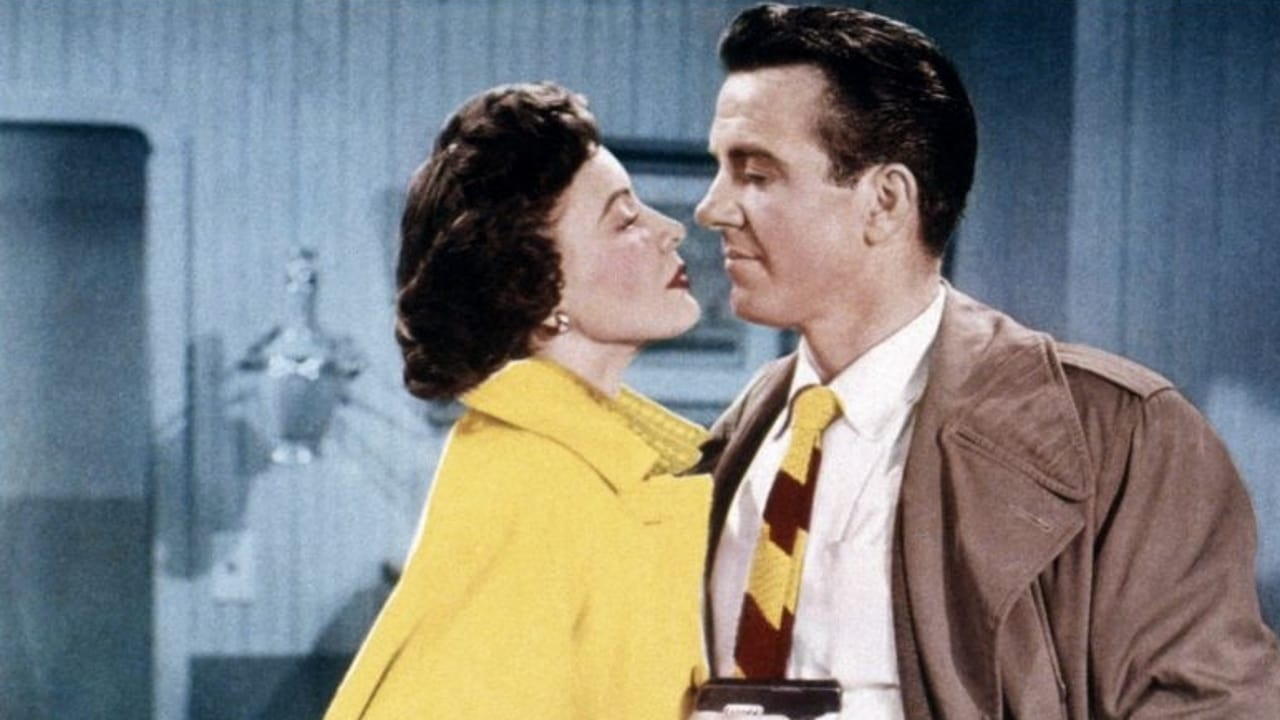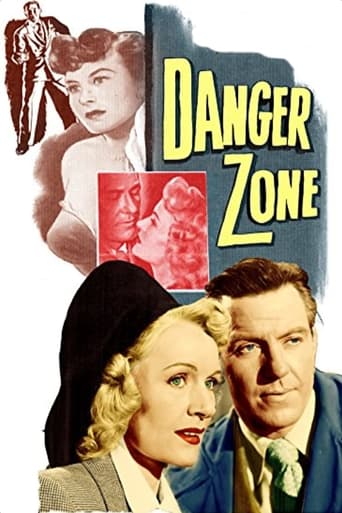

Hugh Beaumont makes his contribution to the Gumshoe Genre as wise cracking Charter Boat Operator / Private Investigator Dennis O'Brien. When the Charter Boat business is a little slow, O'brien likes to pick up a few extra bucks as a PI. Showing a greater penchant for witty repartee than character judgment and well grounded decision making, O'Brien finds himself at odds with an assortment of characters he meets during the course of the day.Danger Zone is filmed as two separate stories combined into a feature length film. In Part One O'Brien is duped by a mysterious woman (Virginia Dale) into bidding on her behalf at auction for a suitcase. As it turns out she isn't the only one interested in the suitcase and it's contents. O'Brien is soon up to the lapels of his overcoat in larceny and murder. Part Two finds O'Brien, apparently none the wiser from his previous experience in Part One, bamboozled by a fellow detective (Tom Neal) into escorting a rich socialite to a party. O'Brien is offered a quick fifty bucks to play tag-along to a rich society dame for the evening. So what could go wrong here you ask? As it turns out plenty.The situation goes sideways when O'Brien is accused of murder by the obligatory hard-nosed police Lieutenant (Richard Travis). Fortunately there to assist O'Brien in his travails is his sidekick Prof. Frederick Simpson Schicker (Edward Brophy). Schicker a Runyonesque type character, given to drink and sesquipedalian lingo, keeps an ear out for the word on the street.Released by Lippert Pictures, this was the first part of a three picture package, each filmed as two separate stories. Lippert was a creative organization, more so financially than artistically, that was able to assimilate name talent that had been cut from their contracts at major studios. Here Lippert filmed two stories that were to be later released as stand alone television episodes. However nothing beyond the original three movies were ever made and as fate would have it, Beaumont never became one of television's legendary detectives.Danger Zone is a low budget double bill programmer and an oddly constructed one at that. As such it's easy to say "keep moving, nothing to see here" but despite the fact that it lacks the gravitas to be a feature film, it might have made a decent television series given the chance.
... View MoreLow budget film noir is a mixed bag. Some truly follow the details of what the perfect film noir is, while others are simply just detective stories which have one or two similar aspects. In the case of this two part Lippert "streamlined" feature, it seems totally like a T.V. detective show, featuring Hugh Beaumont ("Leave It to Beaver") as a man who has the innate ability to seem to being always at the wrong place at the wrong time. He's first seen walking the streets of San Francisco, discussing through narration his plans for the day, and all of a sudden, he's sitting in an auction shop where the beauty next to him asks him to bid on a mysterious leather suitcase for her. What's inside is unknown as there is a bundle of keys that come with it, and the auctioneer has not had the chance to go inside. This leads to a fight between him and others who want the suitcase that simply contains a saxophone. But when this musical instrument leads to murder, Beaumont finds himself up against the S.F.P.D. in proving his innocence.In case two, he's involved in a divorce case where he ends up being made a suspect in the murder of the husband. He then must question the widow's niece and try to find out from the femme fatal widow what really happened. Nefarious characters once again get him into trouble with the same S.F.P.D. detectives, and at just a total of 55 minutes, this is obviously T.V. type viewing minus the commercials. The best sequences come when Beaumont has discussions with a classier than normal Edward Brophy, totally disguising his New York accent here and being less than frenetic in nature. The women are pretty indistinguishable from one another which makes it seem at times that they are the same performers even though they are not. But of the many films released in the VCI "Forgotten Noir" series, this one is perhaps a lot closer to Noir than many of the others.
... View MoreLong before he was Beaver Cleaver's father, Hugh Beaumont had an earlier television series in TV's infancy where he played a private detective complete with Raymond Chandler patter. Lippert managed to get three feature films from this series by stringing two of the half hour episodes together.Beaumont works out of San Francisco where he lives on his charter boat when he's not sleuthing for a fee. This episode concerns him getting in trouble twice because a woman asked him for a favor. The man is not Sam Spade he's more like Miles Archer.Favor one is Virginia Dale who asks him to bid on a suitcase at a public auction. That gets him involved with a smuggling racket and a saxophone. Favor two is when another private eye Tom Neal gets him to 'escort' a young lady to a private party on a boat. That gets him involved with a murder and a divorce. Is anyone sensing a pattern here?Nothing special here though Beaumont is good in a part that's a quantum leap from Ward Cleaver.
... View MoreThis film was so bad it was good. Fireign Theater must have drawn upon Danger Zone when they concocted Nick Danger. The hilariously corny metaphors (e.g., "...about as interesting as Mother's Day at an orphanage..."), the sudden right turns in the plot, characters stiffly showing up out of nowhere, the wise cracking, police taunting leading man. Oh, this is indeed a tarnished gem. And the names. Spadely (shades of Sam Spade) and the rummy bloodhound human mascot, Shicker. (Shicker, of course, is Yiddish for drunkard.) The flatness of the scenes reminded me of the early Superman TV series. Let's all stand around and deliver our lines one at a time. OK, I said my line. Now you say yours. Everybody get a turn? Good. Next scene. It takes about a half hour to solve the mystery, so they introduce a brand new plot with some of the same characters. Oy, what a mess.
... View More